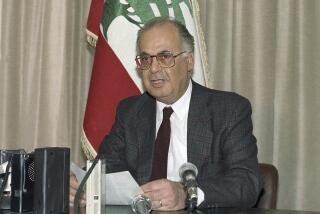Saud al Faisal dies at 75; Saudi prince was a force in Mideast diplomacy
- Share via
Saudi Arabia’s Prince Saud al Faisal, who was the world’s longest-serving foreign minister with 40 years in the post, died Thursday, the ministry spokesman said. He was 75.
His death was announced by the government-owned media. No cause was given, but the prince had undergone multiple surgeries in recent years for his back and other ailments. He cited health reasons when he retired in April.
The tall, stately prince — one of the sons of the late King Faisal — was a fixture of Mideast diplomacy, representing the oil-rich Gulf powerhouse as it wielded its influence in crisis after crisis shaking the region, including Lebanon’s civil war in the 1970s and 1980s, the 1990 Iraqi invasion of neighboring Kuwait and the subsequent Gulf War.
His tenure also spanned Al Qaeda’s Sept. 11, 2001, attacks in the United States, the 2003 U.S.-led invasion of Iraq, the Arab Spring uprisings, Syria’s civil war and the spread of Islamic State extremists.
Mamoun Fandy, author of “Saudi Arabia and the Politics of Dissent,” said Saud’s death marks the end of an era as the elder royals shift power to younger princes.
“The history of Saudi foreign policy is al Faisal, both him and his father,” he said. “It’s how the world knew Saudi Arabia, through al Faisal.”
Saud was born in Taif, Saudi Arabia, on Jan. 2, 1940. He was the second son of the prince who became Saudi Arabia’s third king, Faisal, who ruled from 1964 until he was assassinated in 1975.
After earning a bachelor’s degree in economics from Princeton University in 1964, Saud began his government career in the Ministry of Petroleum. He was deputy petroleum minister before being named foreign minister, a post his father also had held, in 1975.
The young prince, fluent in English and French, brought an air of sophistication and charisma, whether in crisp suits or in the traditional Saudi white robe and gold-trimmed black cloak. Soft-spoken, he often showed a sense of humor not frequently seen among the publicly stolid royal family.
He played a key role in patching ties with the United States after 9/11 attacks, in which 15 of the 19 hijackers were Saudi nationals. He insisted in public speeches that Islam and Muslims are not the enemy, saying in a 2004 address at the European Policy Center in Brussels: “You just cannot dismiss a 1,400-year-old culture and civilization by stigmatizing it as merely a hatchery for terrorism.”
After the 2003 U.S.-led invasion of Iraq ousted Saddam Hussein, Saudi Arabia often bristled over the consequences — the rise of Shiite power in Baghdad and the growing influence there of Shiite-led Iran, the kingdom’s top rival. Saud “had to explain to the world how they hated Saddam Hussein, but objected handing over Iraq to Iran,” Fandy said.
His survivors include three sons and three daughters.
More to Read
Start your day right
Sign up for Essential California for the L.A. Times biggest news, features and recommendations in your inbox six days a week.
You may occasionally receive promotional content from the Los Angeles Times.






